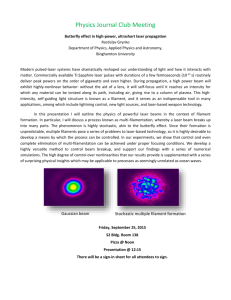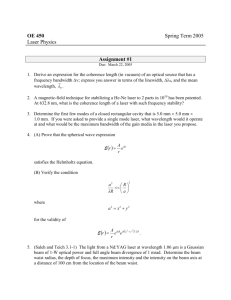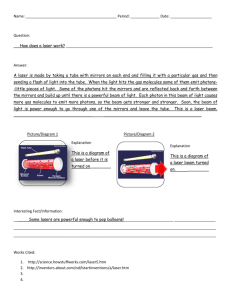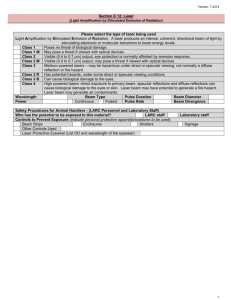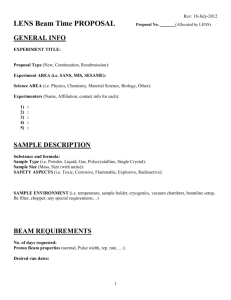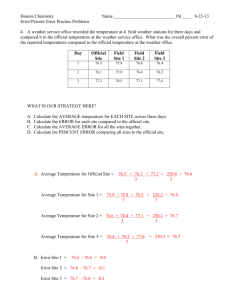Utilizing Laser Spectroscopy of Noble Gas Tracers for Mapping Oil
advertisement
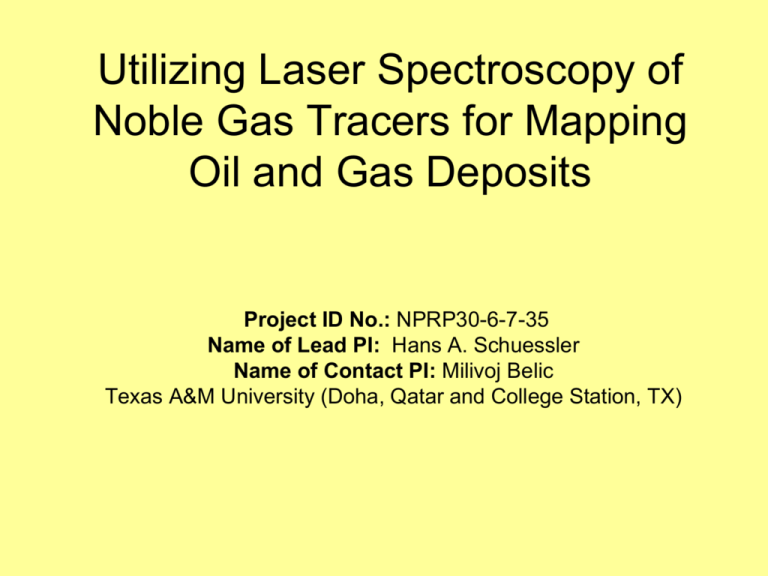
Utilizing Laser Spectroscopy of Noble Gas Tracers for Mapping Oil and Gas Deposits Project ID No.: NPRP30-6-7-35 Name of Lead PI: Hans A. Schuessler Name of Contact PI: Milivoj Belic Texas A&M University (Doha, Qatar and College Station, TX) We thank the Qatar Foundation and the Qatar National Research Fund Founded by His highness the Emir Sheikh Hamad bin Khalifa Al-Thani Chaired by Her Highness Sheikha Mozah bint Nasser Al-Missnad Directed by Dr. Abdul Sattar Al-Taie for this research opportunity and the funds provided. Outline 1. Aims of the project and approach 2. Work done at TAMU, CS Texas: main results 4. Work done at TAMU, Doha •Preparations for investigations of the oil reservoir structure •Selection of a postdoc for continuous work at TAMU-Qatar. •Established additional collaborations on the project with three TAMUQ [Petroleum Engineering(2), Mathematics(2)] Professors. Outline cont. 3. Next steps: • Shipment of the new setup, improvement of sensitivity with a mass separator. • Tracer injections into a well and purification of the recovered gas samples 5. Organizational issues 6. Present status of the project and time table. Aims of the project and approach Noble gases are being used as tracers to measure the structure of gas and oil deposits. Due to their chemical inertness, they offer the advantage that they do not react with the environment with which they are in contact. In standard commercial applications long lived isotopes and nuclear decay counting are being used. Our research will employ stable isotopes, which are environmentally accepted. The novelty in our present approach is that it uses optical detection for noble gases. In particular for krypton (Kr) it relies in using several narrow banded (1 MHz) cw-lasers to excite the rare isotope ions (signal ions) to a high Rydberg level, followed by field ionization and energy discrimination for their detection. We showed that this scheme can be implemented with about 20% total efficiency for 85Kr; it works equally well for all the stable Kr and other noble gas isotopes. Motivation •A need to analyze well gas samples from the Northfield (Dr. Fahes) for rare noble gas isotopes. •Tracer techniques are relatively cheap and informative for reservoir structure characterization. •Allows fast diagnostics of gas/water breakthroughs and plug off efficiency by detecting the migration velocity of the tracers. •The total selectivity is made up as the product of selectivities of the mass separator and of the two laser excitation steps namely Stotal = Smass separator • Slaser1 • Slaser2 = 10-3 • 10-4 • 10-4 = 10-11 Comparison of main detection techniques Nuclear decay detection Optical detection •Standard tracer technique in the petroleum industry to assess size, porosity, connectivity and other important properties of a reservoir •Inject 20 to 40 Curie of 85Kr into a central well •Using decay counting measure the speed and extend of spike migration by sampling surrounding wells •In a large fields nuclear decay counting runs out of sensitivity due to diifusion •About 3 orders of magnitude more sensitive [proven by our on-line work at RIKEN (Japan), TRIUMF (Canada), Oak Ridge National Lab (USA)] •Possible use of rare stable isotopes (Kr, Ar, etc.) •Enviromentally friendly •No safe guarding for nuclear polution •Large amounts of tracer gas can be safely injected •Availability of several tracer gases provides the opportunity for detailed reservoir characterization. Laser spectroscopy parameters in nuclear physics Optical absorption cross section s = l2 = 10-10 cm2 = 1014 barn Useful target thickness d = 1010 atoms/cm3 = 1 pg/cm3 Intensity of photon beam (ring dye laser 1 W/cm2) I = 1019 photons/cm2 sec Excitation rate per atom R = s x I = 109 photons/sec Qatari North Field Work done at TAMU, CS Texas •Publication: paper at the International Laser Probing (LAP 2008) conference. It summarizes the main results and indicates the plan to employ the technique at the Qatari North Field. •Preparations for the next step: work with reservoir gas samples, stable noble gas reservoir injections and purification (Drs. Schutz and Thonnard), planning for improvement of sensitivity with a mass separator (Dr. Wollnik). •Work by Dr. Jinhai Chen (postdoc): construction of the initial apparatus and testing of the vacuum chambers and the beam line setup before shipment to Doha. Laser Probing 2008 conference, Nagoya, Japan Laser Probing 2008 conference, Nagoya, Japan TAMU collinear fast beam apparatus o 31s[3/2]2 o 29d[5/2]3 29d[5/2]o2 o 29d[7/2]3 o 29d[7/2]4 o 29d[3/2]2 } ~ 140 cm -1 488 nm (fixed) 5p[5/2]3 811 nm (tracked) o 5s[3/2]2 The Excitation Scheme (beam energy 5~12 eV) Experimental Setup CI Cs cell FI Postacc Lasers A Interaction region Energy Filter ion Source Mass Resolution B Field N2 0 40 80 Gas (mT) Energy Filter FI Ar Stripped ions R=m/Dm250 ions Xe+ Collisional Ionization CI 120 1.40 1.45 1.50 1.55 1.60 1.65 Voltage (×100 V) TAMU-Qatar fast beam line Source and open beamline segments showing the bending capacitors and the quadrupole triplet. The bending capacitors are for overlapping the ion beam on axis with the laser beam. The quadrupole triplet is to remove possible astigmatism and also serves as one of the focusing elements for the ion beam (does not contain a magnet for mass separation and field ionization region). Preliminary ray trace results for the Wollnik type mass separator in the stigmatic imaging mode: (a) beam distribution in the x,y and z directions, (b) beam cross sections. Prof. Milivoj Belic (contact PI) • Senior Associate Professor TAMU-Qatar • Provides mathematical and computer modeling • Expert in nonlinear optics and optical systems • He introduced the existence of counterpropagating two-dimensional vector solitons and bidirectional waveguides in SBN crystals. • Kummer solitons in strongly nonlocal nonlinear media Prof. Dr. Hermann Wollnik (collaborator) Director of the magnet laboratory at the University of Giessen, Germany World-expert in mass separators and spectrometers, charged particles motion in fields. Author of a famous monograph: Optics of charged particles by H. Wollnik, Academic Press, New York, London, 1987. Dr. Norbert Thonnard (collaborator) Director, Institute for Rare Isotope Measurements, and Research Professor, Departments of Geological Sciences, and Physics and Astronomy at the University of Tennessee. The Institute for Rare Isotopes Measurements (IRIM) explores extremely sensitive analytical techniques using multiple lasers that make the detection of only a few atoms in a sample feasible. Collaborations with researchers word-wide to studies of very old groundwater, contaminant transport and modern groundwater recharge, age-dating of polar ice sheets, and to studies of isotopic signatures in minute mineral grains in meteorites and presolar dust grains to understand the formation and early history of our solar system. Dr. Thonnard measured the 81Kr concentration in groundwater to better understand the flow, recharge and potential for contaminant incursion in a major regional aquifer system. The many instruments in his laboratory include four mass spectrometers, two multi-wavelength laser systems, water and gas processing systems, and lots of vacuum and electronic systems. Particular interest for the current work presents expertise of Dr. Thonnard in purification of gas and oil samples with tracer isotopes. Dr. Schutz (collaborator and consultant) Donald F. Schutz, Ph.D., consultant for the project President of the Geonuclear Inc., Former President of the Teledyne Inc. Dr. Schutz received his doctorate in Geology & Geophysics from Yale University in 1964. Dr. Schutz joined Isotopes, Inc. which later became Teledyne Isotopes and thenTeledyne Brown Engineering - Environmental Services. He performed field and laboratory work, which led to the use of radioisotopes as tracers in oil field operations. In 1975 Dr. Schutz became president of the company and chaired the Radiation Safety Committee until 1998. Iin 1999 Dr. Schutz started Geonuclear, Inc. In April 2000 Geonuclear acquired portions of the Mass Spectrometry Services product line from Teledyne and added it to other on-going work with TLD dosimetry systems and petroleum tracers. Participated in large scale studies of oil reservoirs with traceer gas analysis (Mexico, Dubai, North slope of Alaska). Prof. Dr. Klaus D.A. Wendt (collaborator who can also send students from Germany to TAMUQ) Director of the Laser Resonance Ionization Spectroscopy for Selective Trace Analysis (LARISSA) laboratory, Institute of Physics Johannes Gutenberg-Universitat, Mainz, Germany Renowned expert in Resonance Ionization Spectroscopy, High Resolution Laser-Mass Spectrometry, Ultra Trace Isotope Determination in Environmental, Bio-Medical, Fundamental Research and Applications. The major future stages of the project Spring 2008: The PI (Schuessler) and TAMU coop Industrial Engineering student Ricardo Nava are at TAMU Qatar to install the first half of the collinear fast beam apparatus, which is ready for shipping to Doha. Professor Fahes has reservoir gas which is evaluated fo rare noble gas isotopes for possible tracer use. Professor Nasrabadi uses his expertise to simulate tracer prorogation in a reservoir. Professor Rudolph Lorentz applies data computations and numerical solutions procedures to solving reservoir simulations with differential equations. Professor Samia Jones contributes to statistics and data evaluation. June-December 2009: A postdoc under supervision of the PI and Profs. Fahes and Nasrabadi will will further develop the collinear fast beam apparatus and work with it based on the equipment that was already setup. February to May 2010: By this time and the field ionization part of the collinear fast beam apparatus has also been completed in the TAMU machine shop and has been shipped to Doha by TAMU. The field ionization and energy discrimination stages will be added. Also a simple laser system will be operational. June to December 2010: We will order the remaining equipment items to be shipped directly to Doha. They will be installed into the analytical instrument. The collaborating professors, postdoctoral researchers, and students will start to use the system to process tracer samples at TAMU-Qatar. Floor plan with the laboratory location ½ of the Lab location 356B Boxes with equipment for shipment Documents for ion beam setup shipment Postdoc Dr. Tarek Ali Mohamed Hassan: Degrees: 2003 Ph. D. in Atomic Physics, Sweden, Stockholm University, Atomic Physics Department. 2001 Licentiate degree in Atomic Physics, Sweden, Stockholm University, Atomic Physics Department. 1996 M. Sc. in Experimental Physics, Cairo University. 1990 B. Sc. in Physics, Cairo University, First Class Honors. Education and employment 1- Postdoctoral Fellow, Institute of Physical and Chemical Research (RIKEN), Atomic Physics Laboratory, 2-1 Hirosawa, Wako-Shi, Saitama 3510198, Tokyo, Japan, from 20/1/2005 till now. 2- Postdoctoral Fellow, Laser Cooling Group, Physics Department, National Chung Cheng University, Taiwan from 8/7/2004 till 12/01/2005. 3- Assistant Professor, Cairo University, Beni-Suef Faculty of Science, Physics Department, Egypt from 1/7/2003 to 5/7/2004. 4- Ph. D. student, Stockholm University, Atomic Physics Department, Sweden, Supervisor Prof. R. Schuch, from 24/5/1999 to 2/6/2003. 5- Teaching Assistant, Cairo University, Beni-Suef Faculty of Science, Egypt from 23/4/1996 to 23/5/1999. 6- Instructor and Researcher in Physics, Cairo University, Beni-Suef Faculty of Science, Egypt from 3/10/1990 to 23/4/1996. Tarek BS sertificate TAMU-Qatar Co-PI and Collaborators • Professor Milivoj Belic, Physics (Contact PI) • Professor Mashhad Fahes, Petroleum Engineering • Professor Hadi Nasrabadi, Petroleum Engineering • Professor Rudolph Lorentz, Mathematics • Professor Samia Jones, Mathematics Present status •One complete general setup is available at TAMU, College Station, Texas. It is being used to prepare studies on new elements before on-line work at nuclear accelerators is carried out. •A second dedicated setup for oil and gas reservoir studies is being prepared and part of it has been completed and is ready for shipment to TAMUQ. •Vacuum equipment has been ordered. •Obtain permission and funds for shipping the initial part of the apparatus. •Work within the approved budget and find yearly support for a postdoc staying at Doha (possibly for the whole year). •The PI is at TAMUQ for research and teaching until May 2009. He is accompanied by an undergraduate student (Ricardo Nava, Industrial Engineering). Ricardo will setup the initial apparatus as his co-op project. The PI will come back to Doha TAMUQ later this year and plans to work with a postdoc (to be hired). Tarek BS seriticate - arabic Schematic of the fast ion beam apparatus for rare isotope spectroscopic detection Reactor sample 800 30k 600 20k 10k 0 3k 400 200 0 Beam Energy Sample Diluted (1/5) Reactor sample Counts per 10 seconds 40k Counts per 2 sec Counts per 0.3 sec Teledyne sample 2k 1k 0 Beam Energy Beam Energy Teledyne Reactor Diluted Reactor Expt. 4.0E-6 9.3E-9 1.8E-9 From activity Measurements 1.9E-6 1.6E-8 3.2E-9 Results of concentration measurements on various samples ISAC collinear fast beam laser hut RF ion guide setup
